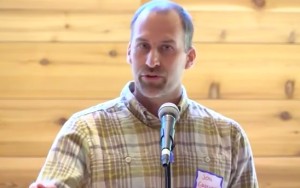The Story of the Seattle Race Curriculum Controversy Finally in Print

Above Photo: From PopularResistance.org.
It’s finally here: the story of the Seattle Race Curriculum Controversy in print (at least 1700 words of it, anyway). I confess that Z Magazine wasn’t my first choice for publication. I haven’t read the magazine, promoted in the classic lefty documentary Manufacturing Consent, in about a decade. Then I learned that Noam Chomsky contributed to the same issue that featured this story, and I remembered why I used to subscribe.
 The link to the Z Magazine article is here, but I decided to repost the story as a blog post so I could reinsert all of the links that disappear in print.
The link to the Z Magazine article is here, but I decided to repost the story as a blog post so I could reinsert all of the links that disappear in print.Not a day goes by that I’m not filled with gratitude to all those who offered support and resisted injustice.
 At first glance, Seattle—home to an openly gay mayor, a Socialist city council member, the highest minimum wage in the country, and a citywide initiative dedicated to “racial equity”—appears to be at the forefront in the struggle against injustice, even one of the most insidious, persistent, and misunderstood forms: racism.
At first glance, Seattle—home to an openly gay mayor, a Socialist city council member, the highest minimum wage in the country, and a citywide initiative dedicated to “racial equity”—appears to be at the forefront in the struggle against injustice, even one of the most insidious, persistent, and misunderstood forms: racism.Nevertheless, Seattle became home to an embarrassing race curriculum controversy, one in which the school district turned its back on the city’s commitment to racial justice and ignored repeatedly its constituents’ outcries—all stemming from the formal complaints of precisely one white family: “We are concerned that the classroom situation has become a very hostile, unsafe learning environment not only for our own daughter, but all the students in the class—characterized by personal attacks, racial stigmatization, emotional out- bursts, moral intimidation, dehumanization, social polarization, and authoritarian indoctrination. ”
Truthfully, I always knew such an email was coming. Social change is always met with backlash.
In 2001, I was hired to help open the Center School, a small school in Seattle Public Schools, and I began teaching the Race Unit in 2002. Drawing in part from a district-wide training on racism called Courageous Conversations, the Race Unit established safe norms for racial dialogue before tackling loaded subjects like institutionalized racism and White privilege. Students next examined their own racial identities and explored strategies to challenge racism. From the unit’s inception, students embraced it. “Wait until the Race Unit,” seniors told the lower grades. Such feedback from students of a variety of racial backgrounds was commonplace:
- “This unit changed my life. Everybody in my class was bonded by it.
- “If it weren’t for this class, I would’ve been another stuck up kid in the world who judges people constantly. Now I look at people and see more than racial profiles…
- “This curriculum prepared me for the world and made me a better person. It should be taught in every school.”
After nine years of resoundingly positive student feedback—without so much as a comment of concern from parents—I forgot what I always knew was coming. On December 7, 2012, during the 10th year of the curriculum, the email arrived. As student safety has always been and will always be my paramount concern, I agreed to a meeting.
Escalation
The father and mother, both white, tag-teamed a series of yes-or-no questions about the Race Unit that quickly turned to accusations, insults, and even threats. The parents rebuffed all my attempts to discuss the student’s well-being, as well as potential accommodations, making it clear that this meeting was about their political agenda, not their student, who—until the day of this meeting—had always appeared engaged, interested, and participatory.
Their agenda? “We are asking you not to use racial language in reference to students in the classroom.” The parents implied that I should not even permit students to use the words “White people.” They believed that district policies as well as state and federal laws, prohibited “‘personal conversations based on race’ in a classroom.” I could not agree to requests that adopted a colorblind approach to race, as colorblindness itself can be considered a form of racism. Furthermore, doing so would not only disregard United States history, but it would also invalidate district trainings, district policy, and, most importantly, the experiences of countless people for whom race is a fundamental part of their identities.
On January 8, I received a letter from Human Resources; I was under investigation for creating a hostile environment. In the parents’ five-page, single-spaced complaint formatted like a legal brief, I was accused of a host of inappropriate behaviors that contradicted my yearly evaluations, filled with praise:
- Allowing free and unlimited student expression of personal racial prejudice, and The Story Of The Seattle Race Curriculum Controversy Finally In Print | PopularResistance.Org:
